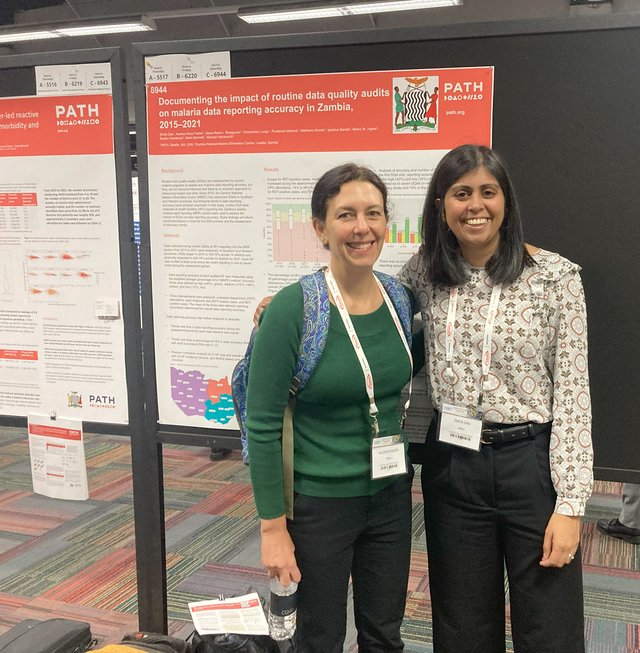On the International Day of Women and Girls in Science, PATH Malaria celebrates the incredible women in STEM who make our work possible. Their contributions to the fight against malaria—ranging across areas of expertise as diverse as data and modeling, research to improve new malaria tools and approaches, and malaria program planning and implementation—help drive our work to support strong, resilient, and sustainable malaria programs.
We spoke with some of our team members to learn more about their journey as a woman in science and hear their advice to others looking to pursue a STEM career.
Q: What first sparked your interest in science?
Smita Das, Senior Monitoring & Evaluation Officer: I dissected a frog for the first time in my 7th grade biology class! It was so cool to both see and learn about human anatomy and physiology through a frog.
Arantxa Roca Feltrer, Regional Malaria Director, Malaria Control and Elimination Partnership in Africa (MACEPA): Knowing that there were still so many unknowns, and so many answers and public health solutions yet to be discovered. Being part of that discovery was exhilarating for me!
Christelle Gogue, Deputy Director, MACEPA: I always enjoyed science in grade school. I think it’s because it felt like I could see the lessons play out in my everyday life. Lessons about the digestive system in biology, or electrical circuits in physics, evaporation and condensation in chemistry – it never felt so much like I was studying, but rather that I was getting answers to questions I had.
Patricia Mambo, Entomologist – Morphological ID and Data Entry Officer: Curiosity! As science is about inquiry and gathering evidence, my interest in learning something new each day motivated my decision to venture into science.

Patricia Mambo is an entomologist on the Attractive Targeted Sugar Bait (ATSB) project, investigating a new tool targeting outdoor-biting mosquitoes. Photo: PATH
1 of 5
Hayley Thompson (center) works as a Research and Data Analyst on the PATH Malaria and NTDs team. Photo: PATH/Hayley Thompson
2 of 5
Smita Das (right) presents results of her team's work at the 2023 American Society for Tropical Medicine and Hygiene Annual Meeting in Chicago. Photo: PATH/Tara Bracken Davis
3 of 5
MACEPA team members, including Hayley Thompson (top center), Smita Das (middle left) and Christelle Gogue (bottom left), at the 2023 American Society for Tropical Medicine and Hygiene Annual Meeting in Chicago. Photo: PATH/Tara Bracken Davis
4 of 5
Arantxa Roca Feltrer serves as MACEPA Regional Director for East and Southern Africa with a particular focus on surveillance strengthening, data quality, data visualization and operations research. Photo: PATH
5 of 5Q: What scientific question most interests you? Are there any specific problems you hope to address through your work?
SD: I am fascinated by vector-borne diseases, particularly in understanding the host-vector-microorganism/parasite interactions. As malaria is a parasite carried by a mosquito vector, I’m interested in how this can be exploited to limit malaria transmission and reduce disease burden.
AF: I have always been interested in contributing to the malaria fight. Malaria is a disease that nobody should die from—it already has a cure, and yet remains one of the leading causes of child death every year.
CG: There have been some great solutions developed to address our challenges in health. A perpetual struggle we face as a global community despite all the progress is the lack of equity in accessing those solutions. Diseases like malaria have cures developed decades ago but are still killing millions—and one of the reasons why is inadequate access to care. The work we do at PATH addresses these issues of equity and access to public health solutions. I hope we continuously push to provide everyone, especially the most vulnerable, with access to at least basic care.
PM: Many people have little knowledge about the burden of malaria. Through my work, I wish to be a vessel of information for those that need to learn more about this deadly disease.
Q: What advice do you have for young women and girls interested in pursuing a career in science?
SD: Find a mentor who can help you navigate professional challenges, celebrate your successes, facilitate networking, and support your goals.
AF: Find the topic that motivates you and enjoy the “never-ending learning” journey. It is a very rewarding career path!
CG: I’ve received so much great advice that I apply every day to my life—it’s so hard to share just one! In a community with so many experts, it’s easy to feel intimidated, but we all have something to contribute, no matter how young or new to a field we are. We all have the right to a space at the table. But also, don’t forget to create space for others as you grow more comfortable.
PM: Go for it! Being able to be in a position that brings about change in the world through science and technology is admirable.
Hayley Thompson, Research and Data Analyst: Stay passionate and curious about your interests in science, but also don’t be afraid to explore new disciplines—science is all about exploration, after all! Finally, something I always try to remember is to not be afraid to reach out to those in your field who inspire you—you never know where it could take you.

